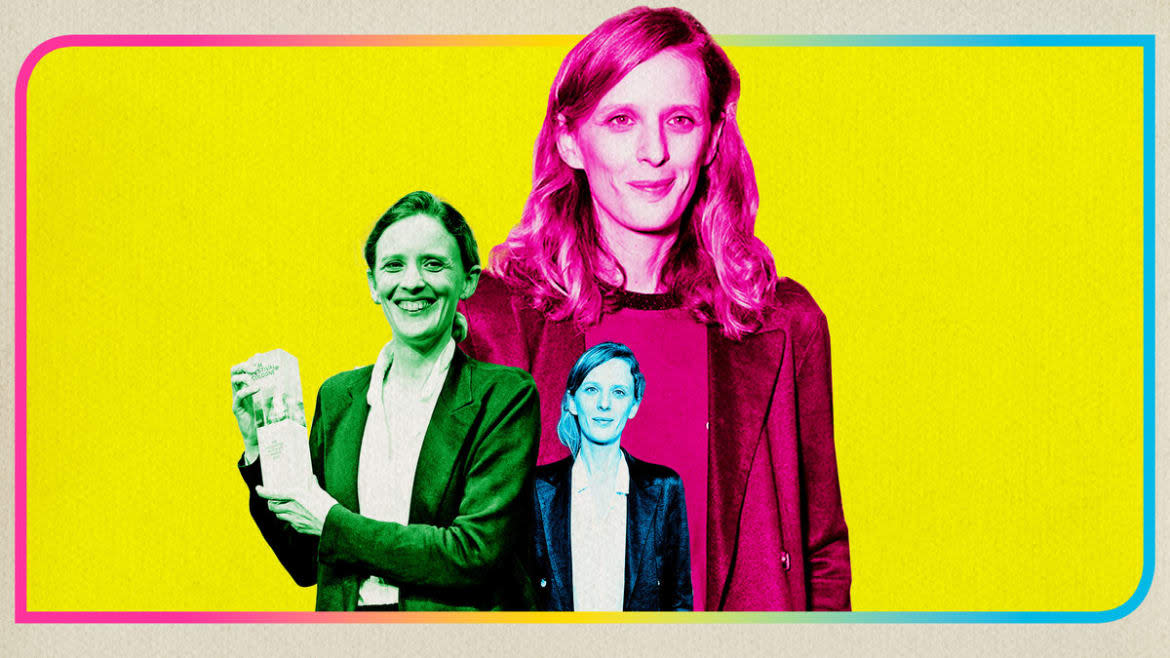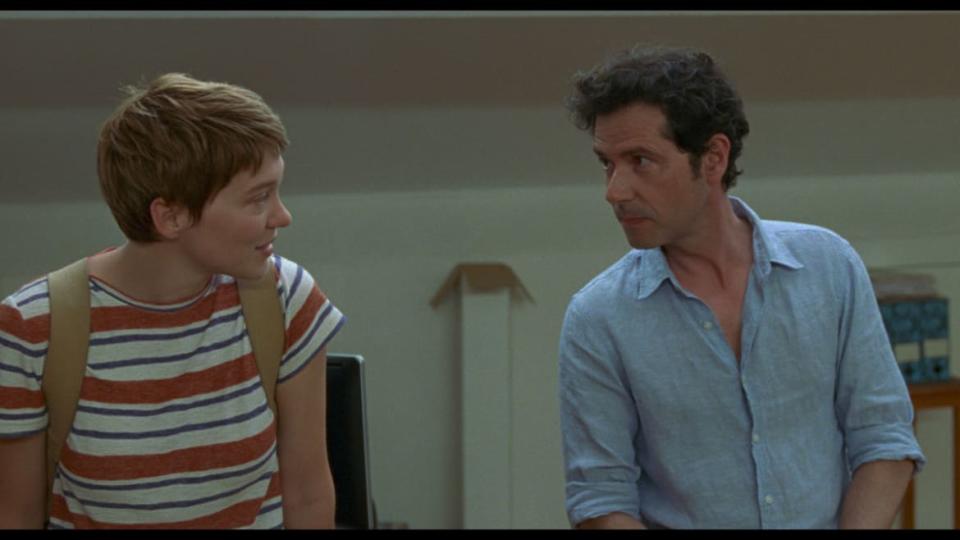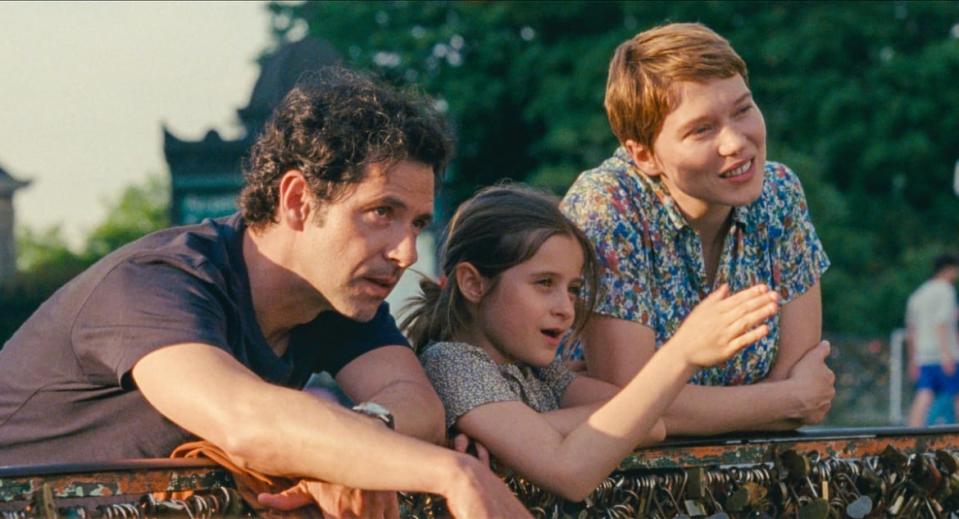Mia Hansen-Løve Denounces Hollywood’s Sex Scenes: ‘They Don’t Have a Soul’

Mia Hansen-Løve had to teach Léa Seydoux how to kiss and make love in front of the camera to film One Fine Morning. But why? Seydoux has starred in a number of French films with plenty of sex, allured as one of the most enchanting Bond women of all time, and most recently, got super freaky in David Cronenberg’s Crimes of the Future. Needless to say, the Blue is the Warmest Color actress has plenty of experience with on-screen intimate encounters.
Still, Hansen-Løve recalled seeing Seydoux blush when she was asked to kiss Melvil Poupaud, who plays the love interest in their new film One Fine Morning, which releases in theaters this weekend. After Sandra (Seydoux) and Clément (Poupaud) meet through their two young daughters, the pair begin an affair—he is married, she is widowed—that starts with a playful kiss in his lab. Their first kiss (which, delightfully, starts as a joke) is a tender, electric moment—possibly because of how awkward it was to film.
“[Léa] was so afraid,” Hansen-Løve told me over coffee at the New York Film Festival last October, where the film had its North American premiere. “She came to me and she said, ‘Oh, Mia.’ I couldn’t believe it!”
The director can’t pinpoint exactly why Seydoux faced this kissing anxiety, but she predicts most of it came from One Fine Morning’s sense of authenticity. Hansen-Løve has openly stated that she’s against the concept of “performances,” telling me that acting should be “invisible.” Maybe this is why Seydoux was so aghast by a smooch. It felt like a real first kiss: clumsy, awkward, sloppy.
“For some reason, I don’t know if it had to do with the atmosphere of the shooting of my film or maybe because it was less cinematic than she’s used to—more like real people,” Hansen-Løve said. “The fact that she was playing somebody more real than some other parts she’s had, it was more intimidating for her.”

Sandra and Clément take their first kiss even further in One Fine Morning, with a smattering of intense, passionate sex scenes as their affair unfurls. It’s the first time Sandra’s had sex in a number of years, so the sudden spree of intimacy leads her to total infatuation. Their relationship isn’t the main plot—really, there isn’t one. Hansen-Løve’s film features a number of life dilemmas: Sandra’s father struggles with dementia, her daughter is faking a leg injury and limping all over Paris, and this affair is driving her mad with love.
It’s not just the romance that displays Hansen-Løve’s knack for evoking real life in her films; it’s every moment of intimacy, from Sandra’s father’s own relationship to Sandra’s daughter’s penchant for snuggling. The French director sat down with The Daily Beast’s Obsessed to chat about how realism derives from a love of filmmaking, and why bigger Hollywood movies get that wrong.
I read Vanity Fair’s profile of you, and every actress—Mia Wasikowska, Vicky Krieps, Léa, etcetera—asked to comment for it responded within 24 hours. That’s incredible. How do you develop such deep bonds with your leading ladies?
I try to create a relationship out of trust, but I guess that’s what most directors try to do. It’s not necessarily friendship, because that’s not something you can really decide, but at least of respect and mutual trust. I always had this conviction that you can get the best out of the actresses by making them feel that you trust them. It doesn’t necessarily mean that you don’t have a critical look on what they do, if it doesn’t feel right.
I know a lot of directors, in the past, have worked in a very different mood, looking for conflict. I think great films were made out of terrible relationships between directors and actors, but it’s not what I believe in.
Why is it important to avoid that conflict on set?
It has to deal with the fact that I always thought that making films was both about art and the art of living. When you make a film, it’s not only about the result and how good the film will be, what it will mean in the history of cinema—it’s also about the experience itself. It’s about our lives, at the end. When I make films, it’s not only in order to get praise and to make films that will mean something when they’re done. I make films because it’s my choice of living. It’s how I want to live.
I absolutely think that the quality of the relationship you have with actresses, what you create on set—the film holds the memory of that somehow. In my films—and I made a film about it, Bergman Island—I always work with this idea of connecting life and cinema. My desire to create a peaceful, beautiful relationship with the actors is part of my projects.
Daisy Ridley’s Acting Tour de Force Is Stunning Sundance
On a similar note, you really respect the kids in your films. Why is that important to you?
The typical bad Hollywood—well, not [just] Hollywood, because you see this in any film. The typical bad scene with a child, and I was really aware of wanting to avoid it, was the scene where the parents say to the kid, “Go to bed now.” And the kid says, “Yes!” and immediately goes to bed. Anybody who has had a kid knows that it never happens like that in life. Or the kids are in the bed for one shot, where the parents kiss them—and it’s over, you get rid of the kids.
If you film kids, you have to look at them. You have to make them exist, in a way. I’m extremely attentive about that. Otherwise, you shouldn’t have a kid in your scene. Let it exist on screen. To me, it’s both an ethic and an aesthetic, in a way. What we do with kids in films—how we look at them, how much we let them be, how they are, how much freedom we give them, how much space, but also how we use them dramatically speaking to create emotions—there’s a red line, to me, of what is forbidden and what you’re allowed to do. When some directors cross that line, to me, there’s an existential opposition, you know?

Yes, exactly. In One Fine Morning, I love that Sandra’s daughter always wants to cuddle with her mom, sleeping next to her in bed.
Every time I work with kids, I always try to find a way to have scenes where they have that space for themselves. The fact that we had these kinds of experiences together, where they can really be themselves and play and have lines to say, that helped a lot to create relationships with me and the other characters. It brings a lot to the film.
Something else that can be handled clumsily in films is technology. But I love the way your characters use their phones—or rather, how they hate their phones, because their lovers don’t text back.
As you say this, I’m realizing the phones in my films are always used as women wait for messages from boys they’re in love with.
I relate to that!
I guess that’s why they’re so important. That’s how we communicate today. Not always, but when we’re not together with people we love—it’s not like we write letters anymore. I wish they were not there, the phones. I hate filming phones, honestly. I don’t find that inspiring, I don’t enjoy filming them, but it’s just part of our lives and I have to accept it.
The only reason these phones are here is because they’re a part of our worlds, so they have to be a part of the worlds of these girls—especially when they have to communicate with men they’re in love with. It’s something I try to face, and it’s there, but I’m not going to overplay. Some directors really enjoy it and show it on screen, as if you would want to show how connected they are with modernity. I’m not.
The characters don’t really like looking at their phones either.
It tells more about their feelings, how dependent they are on these [texts]. It helps them.
The subject of sex scenes is so touchy—people hate them, think they’re redundant. Or take Marvel movies, which ignore sex entirely. Why did you find it essential to include so many in One Fine Morning?
From my director’s point of view, sex scenes are often problematic. Not so much because of what it means for the actors to be involved in these scenes—that’s another debate, not what I mean here—but more because I find them very conventional. I have the feeling that most of them are the same shots that are being reused. They’re supposed to be efficient, somehow, but they don’t have a soul.
There are millions and millions of shots of people kissing and making love that don’t say anything about the feelings. It’s extremely difficult to have these contain the sexuality, but also depth that I want to give it.
Ira Sachs’ Queer Love Triangle ‘Passages’ Has the Hottest Sex at Sundance
How do you give a soul to your sex scenes?
I took my time. It’s my eighth film, and it actually took me some time to be able to film those scenes. It was very difficult to film those scenes, because of my own shyness and the shyness of the actress I was working with, which made me even more shy. It was a whole process to learn how to approach that. I didn’t want to go in with the conventional shot, so I had to find my own language.
I’m not afraid anymore. I’m less shy. But I would never try to pretend that I am more self confident, or that my actors are more self confident than they should be. I’m not going to pretend—you see in so many films, when you see people having sex and they know how to be so good at it, so self-assured in their gestures. Everything is so perfect and professional, in a way. I don’t want that. In this case, it’s even more true, because it’s about a woman who didn’t have sex for many years.
Was Léa really that shy?
She was totally afraid of kissing. It’s just a kiss! The first kiss scene, when she goes to the office and they pretend that the other has to kiss first, you can see she’s blushing, so intimidated. It was totally Lea’s experience. Thanks to that, there is an innocence in the scene that you can actually feel.
That’s so funny, because I saw someone online say that these two actors are the two best kissers in cinema.
Maybe that freshness is why they kiss so well. We see a lot of great kissers in cinema, because maybe [the actors] do it too well. They know how to do it, and there’s no awkwardness. It gives more grace to these scenes. I’m not trying to make them look more at ease than they are.

When I saw Bergman Island in 2021 at New York Film Festival, a woman asked during the Q&A, “Will men ever understand this movie?” One Fine Morning film also focuses on motherhood, and womanhood in general. How do you hope men interact with your films?
My films don’t address the gender of people, they address their sensibilities. Something I’ve said often but I truly believe is that I think femininity doesn’t belong to women. Some man directors can make films that are very feminine, and some women make films that are masculine, in a way. It’s not only a matter of gender. To me, it’s mostly a matter of sensitivity. As far as I know, luckily, there are men who are as sensitive as women are. Most of my films are portraits of women, but there are also some that are portraits of men. I feel as much empathy for these characters as the female characters of my films.
I was taken aback when I heard that question—there were men in the audience!
Maybe you should ask that question to the men who like my films, and they can explain why.
Get the Daily Beast's biggest scoops and scandals delivered right to your inbox. Sign up now.
Stay informed and gain unlimited access to the Daily Beast's unmatched reporting. Subscribe now.

